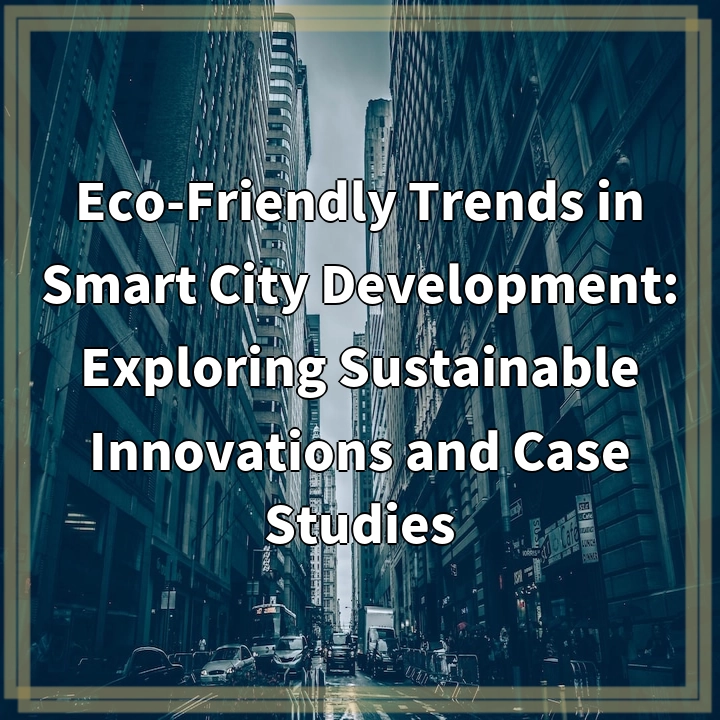
What it is:
Smart city development is a growing global trend that focuses on integrating technology and data to enhance the quality of life for urban residents while minimizing environmental impact. These smart cities prioritize eco-friendly solutions to address pressing environmental challenges such as climate change, resource depletion, and pollution.
Real-World Problems:
As we embrace the concept of smart cities and their potential for environmental sustainability, it is important to acknowledge and address the real-world problems that arise during their development. Some of these challenges include:
1. Limited Resources:
Developing eco-friendly smart cities requires a substantial amount of resources such as land, energy, and water. The availability and management of these resources pose significant challenges, especially in densely populated cities where demand is high.
2. Infrastructure Upgrades:
Transitioning existing cities into smart and eco-friendly environments often requires significant infrastructure upgrades. This includes implementing smart grids, renewable energy systems, waste management systems, and efficient transportation networks. The high costs and logistical complexities associated with these upgrades can be a major hurdle for city development.
3. Data Privacy and Security:
Smart cities rely on data collection and analysis to optimize various systems and services. However, this raises concerns about data privacy and security. The collection of vast amounts of personal data, if not properly safeguarded, can compromise individuals’ privacy and leave them susceptible to cyber threats.
4. Inequitable Access and Affordability:
Ensuring equitable access to smart city innovations can be a challenge. The implementation of advanced technologies and infrastructure upgrades may not reach all communities, resulting in a digital divide and exacerbating existing inequalities. Additionally, the affordability of eco-friendly solutions may pose financial barriers for some urban residents.
5. Social Acceptance and Behavioral Change:
Attaining sustainability goals in smart cities relies heavily on influencing individual behavior. Encouraging residents to adopt eco-friendly practices and embrace technological advancements may require significant cultural and social changes. Overcoming resistance to change and fostering widespread acceptance can be a complex and time-consuming process.
Conclusion:
While the development of eco-friendly smart cities holds immense potential for addressing environmental challenges, it is crucial to recognize and navigate the real-world problems that can arise. By addressing issues related to limited resources, infrastructure upgrades, data privacy and security, equitable access, and behavioral change, we can strive towards creating truly sustainable and inclusive smart cities for the benefit of both present and future generations.

Solutions:
To overcome the challenges associated with eco-friendly smart city development, several solutions can be implemented:
1. Efficient Resource Management:
Implementing strategies for efficient resource management is crucial. This includes incorporating renewable energy sources, implementing water conservation measures, and promoting sustainable waste management practices. Smart technologies can help optimize resource usage and reduce waste.
2. Collaborative Partnerships:
Forging partnerships between governments, private companies, and community stakeholders is essential. Collaboration can bring together diverse expertise, resources, and perspectives to tackle various challenges in smart city development.
3. Robust Data Privacy and Security:
Prioritizing robust data privacy and security measures is vital. Ensuring transparent data governance, strong encryption protocols, and anonymization techniques can help protect individuals’ privacy and mitigate cyber risks.
4. Inclusive and Affordable Access:
Efforts should be made to ensure inclusive and affordable access to smart city innovations. This can involve providing equal access to technological infrastructure and services across different communities, as well as exploring innovative financing models for eco-friendly solutions.
5. Community Engagement and Education:
Promoting community engagement and education is necessary to drive behavioral change. This can be done through awareness campaigns, educational programs, and incentives to encourage residents to adopt sustainable practices and embrace smart city technologies.
Conclusion:
By implementing these solutions, eco-friendly smart city development can overcome real-world challenges and progress towards a sustainable and inclusive urban future. Efficient resource management, collaborative partnerships, data privacy and security measures, inclusive access, and community engagement play pivotal roles in achieving the vision of eco-friendly and smart cities.















